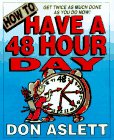
How to Have a 48–Hour Day
Don Aslett
“If you want to get something done, ask a busy person.” How to Have a 48–Hour Day explains why this saying is true. If you’re looking for a book that suggests you can accomplish more by doing less, you will be disappointed: This is like one of those tiresome diet books that tell you the only way to lose weight is to eat less and exercise more.
As he does in many of his other books, Aslett tells us things that we already know, but in such a way that we believe them. He provides no great revelation, no fancy organizational system. Instead, he dresses up wisdom in an entertaining, inspirational package. A few of his suggestions—such as cutting back on sleep—go too far, but most represent sound, common sense.
- It’s good, not bad, to be productive. People who get things done generally find that success, happiness, confidence, respect, motivation, options, influence, and security follow.
- The measure of productivity is not how hard you work, nor how busy you are, but what you actually accomplish.
- To do more, first do less. Get rid of unnecessary and unhelpful possessions, activities, relationships, habits, distractions, interruptions, and worries that clutter your life and divert your time and attention from what is important.
- Determine your direction. From ethical values to career goals to family relationships, knowing where you are going makes it possible to set priorities and think clearly when you come to a crossroads.
- Realize that you are going to have to learn to work within the time you have. Finding a large block of time in which you can catch up is about as likely as getting out of debt by winning the lottery.
- BE EARLY. This is his most important point. Work ahead, not behind. Keep a “frontlog”—a list of things to do ahead—rather than a backlog. Being early eliminates deadline stress, allows for more options, and reduces the chance that you will be derailed by unexpected problems.
- Keep many irons in the fire; be working on a variety of projects simultaneously. As long as you’re working well on a particular project, keep going. When your interest and concentration wane, “jump ship” to another project. If you have a large “to do” list and are working ahead instead of behind, you can work at your peak for each job, and rest by doing different work, rather than stopping. As a side benefit, your subconscious often continues to work on the previous project after you’ve switched, so you may find additional insights when you return. With many goals to work toward, you can always be making progress even if you run in to an obstacle or find yourself in a slump.
- Keep your schedule flexible. If you tie yourself down too rigidly, you won’t be able to “go with the flow” and work at your peak.
- Take work with you wherever you go, so you can take advantage of travel and waiting time.
- Use time fragments. Many small moments add up to much time either used productively or wasted.
- Avoid overkill. It’s counterproductive to do more when less is enough.
- Do it now, perfect it later. Don’t wait till your product (project) is “perfect” to get it out into the real world. You’ll profit from the feedback.
- Getting started is the hardest part of a job, so make it easier. Keep your tools and projects handy, lay out your clothes the night before, make sure the car is filled with gas, straighten the mess in the evening rather than leaving it for the next day.
- Don’t wait to be in the right mood to get started. Get moving, and the right mood will usually follow.
- Don’t allow low–fuel jobs to burn high–fuel time. Do your hard work during your most productive times, and save the easy work for when your energy is low.
- Keep spares on hand—tools, supplies, cash. You don’t want to interrupt something important to run to the store.
- Practice preventive maintenance. It takes less time and trouble to repair things before they actually break.
- Observe productive people and learn from them.
- Be at peace with the people in your life. Disharmony wastes much time and energy.
- Learn to love work. Good work is healthier and more rewarding than most so–called recreation. Working around and with your family and friends builds better relationships than most leisure activities.
The last, I believe, is the key to Aslett’s success. He really enjoys what he is doing. I’m sure it helps that he is self–employed. He has been accused of being a workaholic, of never taking time to “smell the roses.” When you love your work, the division between work and the rest of life blurs, as we discovered with homeschooling. School was never “out”; there was no distinction between “school” and “fun.” There was just life, and life was both education and recreation. Don Aslett would add that roses smell far sweeter if you’ve labored to grow them yourself.